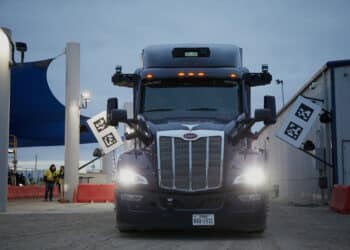Commercial vehicle rental and leasing company Ryder System is adding thousands of light-duty, electric vans to its fleet.
Ryder is adding 4,000 commercial electric vans manufactured by BrightDrop, a subsidiary of General Motors, by the end of 2025. The move will expand the relationship between Ryder and GM, which already provides vehicles for the rental company’s fleet, Carlo Rodriguez, group director of advanced vehicle technology (EVs) at Ryder, told Equipment Finance News.
Ryder has established partnerships with three other OEMs that manufacture electric vans: Ford Motor, Mercedes-Benz and Stellantis’ Ram brand. The company has 40 Ford E-Transits in its fleet across three locations, Rodriguez said.
The E-Transits are available in California and the Midwest, but the company plans to release the first BrightDrop electric vehicles across four business units in Northern California, northern Dallas-Fort Worth, New York and Southern California, he said.
The BrightDrop EVs will expand Ryder’s ChoiceLease and commercial rental programs, with the first 200 vehicles ordered this year.
Ryder’s end-of-year ChoiceLease fleet count in 2022 was 135,400 units, down 5.9% year over year, while the company’s end-of-year commercial rental fleet count for 2022 was 41,800 units, up 2.7% YoY, according to the company’s February 15 10K filing. Ryder’s rental utilization rate for power units was 82.9% in 2022, up 250 basis points YoY.
Still, the company is concerned about macroeconomic conditions affecting the rental market, Robert Sanchez, chairman and chief executive of Ryder, said during the company’s Feb. 15 fourth-quarter earnings call.
“We expect macroeconomic and freight conditions to soften in 2023 and lower the demand for used vehicles in rental,” Sanchez said. “We expect OEM production constraints and delivery delay to continue throughout 2023, delaying the revenue and earnings impact from new leases signed.”
Compliance issues drive EV push
The California Air Resources Board’s (CARB) compliance standards are playing a big role in Ryder’s EV expansion in California, Rodriguez said.
“California is a key market because of CARB compliance,” he said. “A certain percentage of your fleet by Jan. 1, 2025, has to be CARB compliant, so California is a big market for that. California has also accelerated EV adoption more than other states when you consider activity there and public and private infrastructure.”
Other states are likely to adopt regulations similar to CARB, which will lead to more EVs being manufactured, Rodriguez said. “Other states are adopting CARB rules and other regulations, so it will spread from a regulatory perspective,” he said.
Ryder plans to add EVs to its fleet, Rodriguez said.
“You have the regulatory compliance, you have sustainability goals that companies like Ryder have, and it makes sense from an operational perspective because the light-duty vans are close to the [total cost of ownership] equivalent of an [internal combustion engine] vehicle,” he said. “There are other benefits, like driver satisfaction and technician satisfaction.”
Demand for commercial electric vehicles also continues to grow, Rodriguez said.
Commercial EV renters and lessors have “CARB compliance or other states with regulatory compliance, they have their sustainability goals from their leadership or their board, and they have their operational items,” he said. “The operational need of being able to have early experience testing and demoing a certain percentage of your fleet EVs so you’re not trying to catch up in the fourth quarter of the game [contributes to] interest and demand.”










